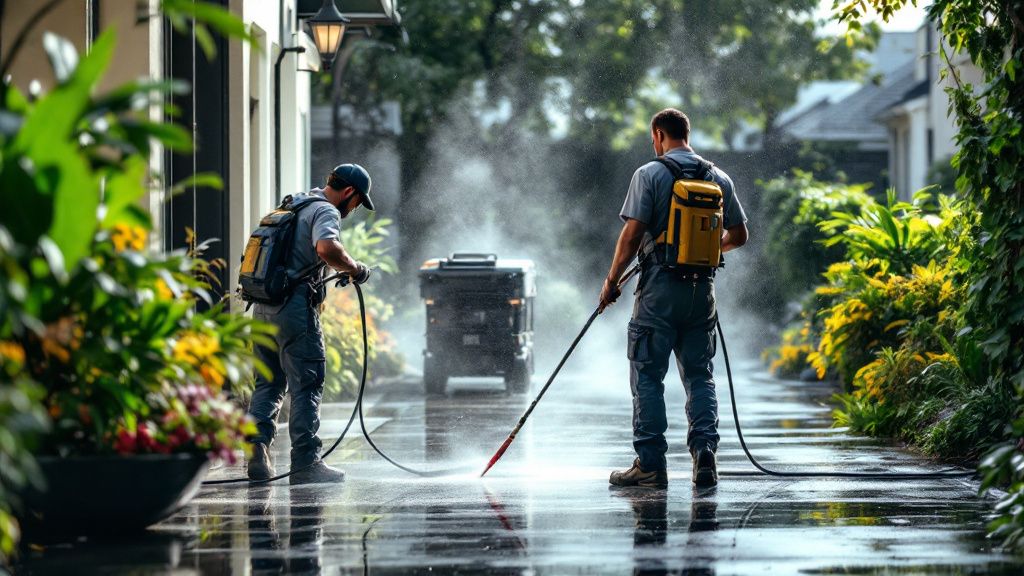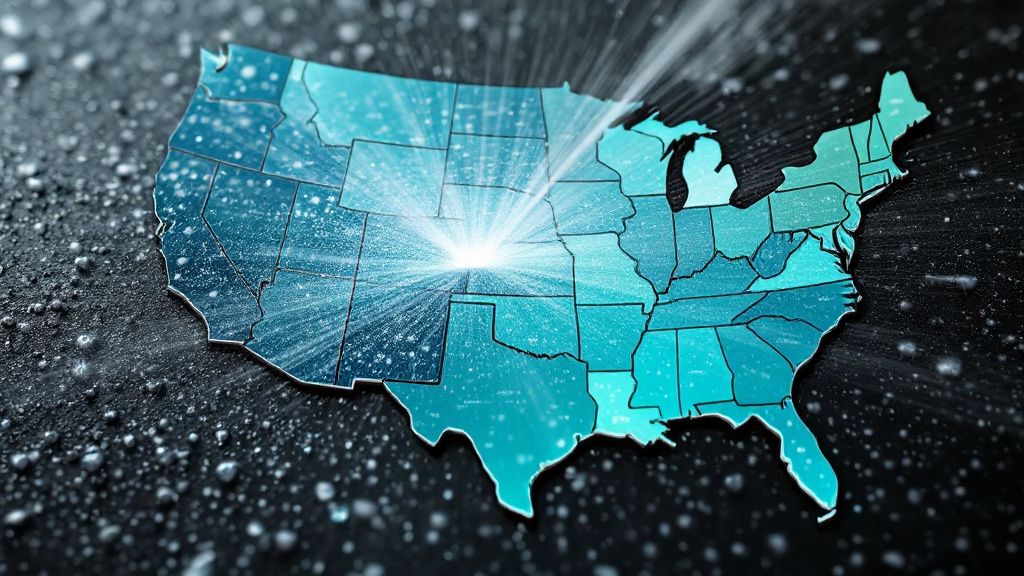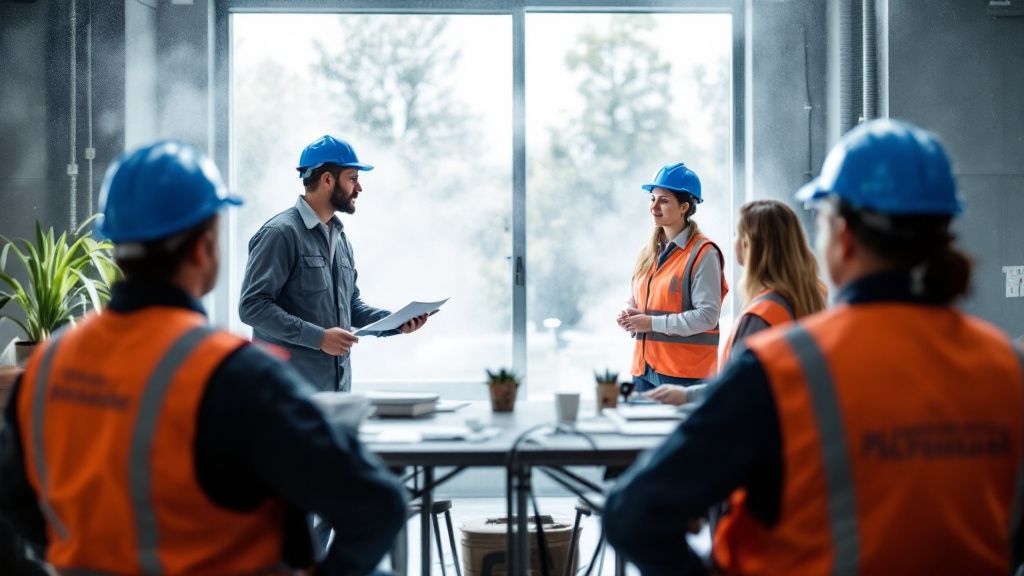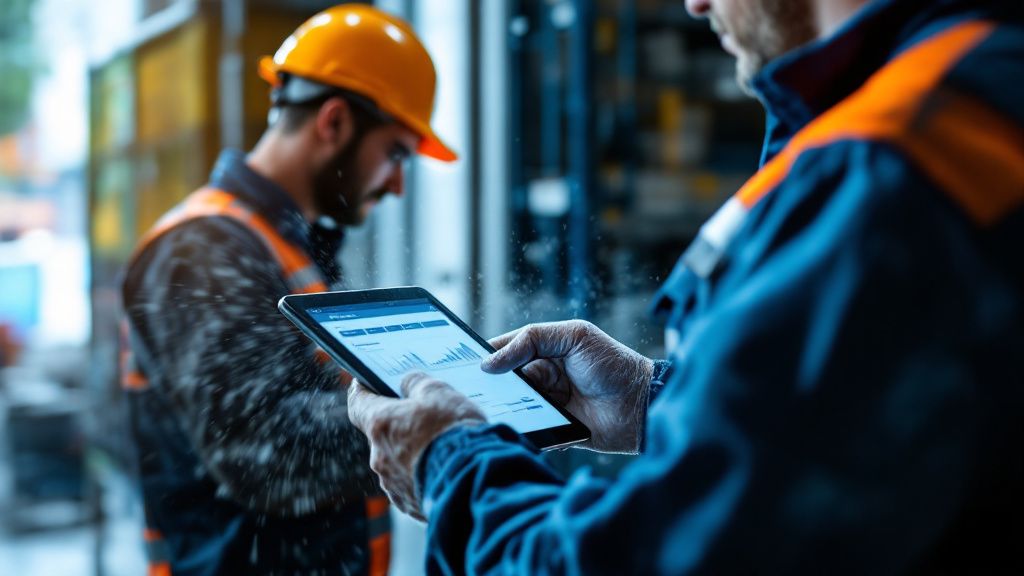Navigating the landscape of pressure washing for businesses requires a thorough grasp of extensive regulations. Understanding and adhering to pressure washing regulations is critical for maintaining compliance, which not only safeguards your business but protects the environment as well. With strict commercial cleaning standards in place, you must ensure proper pressure washer safety, wastewater management, and obtain necessary pressure washing permits. Emphasizing eco-friendly pressure washing and environmentally responsible cleaning is essential in today’s eco-conscious market, promoting sustainable cleaning solutions. It’s imperative to comply with water usage regulations and adhere to detergents and chemicals regulations to minimize environmental impact. Maintaining business sanitation guidelines while focusing on health and safety compliance can enhance your business’s reputation. Moreover, possessing pressure washing certification and abiding by equipment standards strengthens your operational credibility.
Effective commercial property maintenance and industrial cleaning compliance are continuously improved by keeping abreast of pressure washing best practices. Ensuring proper disposal of runoff and managing graffiti removal are integral aspects of environmental compliance. As you refine your business cleaning services, ensure that pressure washing insurance requirements are met to protect against unforeseen liabilities. Mastering compliance within the pressure washing industry not only enables you to improve your business operations but also positions you as a leader in sustainable and responsible commercial maintenance solutions.
Understanding Local Regulations
Grasping the nuances of local regulations is crucial for effective commercial pressure washing. Different regions enforce distinct pressure washing regulations, reflecting their unique environmental priorities and community standards. You must understand these variations to align with industrial cleaning compliance and safeguard your business operations. By familiarizing yourself with business sanitation guidelines and pressure washing legal requirements, you can enhance your reputation as a reliable service provider.
To truly navigate these regulations, you need to move from a focus on mere compliance to embracing environmental responsibility. Meeting surface cleaning regulations and managing wastewater effectively with eco-friendly pressure washing practices is vital. When prioritizing environmentally responsible cleaning, ensure that you adhere to water usage regulations and proper disposal of runoff to maintain eco-conscious operations.
Embracing this mindset shift also involves incorporating sustainable cleaning solutions into your services. Acquiring pressure washing permits and ensuring your practices are congruent with detergents and chemicals regulations will demonstrate your commitment to both compliance and environmental stewardship. Adhering to business pressure washing standards not only solidifies your status in the industry but also contributes positively to the community.
Awareness and adherence to pressure washing equipment standards and pressure washing best practices will facilitate proper commercial property maintenance and building exterior cleaning. By investing in pressure washing certification, you ensure that health and safety compliance is maintained, protecting both your employees and the wider public while promoting efficient business cleaning services.
Acquiring Necessary Permits and Licenses
Securing the necessary permits and licenses is a fundamental step in establishing legitimacy in commercial pressure washing. Each area has its own set of requirements, often influenced by local environmental compliance and pressure washing regulations. Understanding these requirements is crucial to ensure that your business cleaning services adhere to industrial cleaning compliance and commercial cleaning standards. By aligning your practices with these regulations, you contribute to community welfare and safeguard your business operations.
Acquiring pressure washing permits usually involves liaising with local authorities who oversee water usage regulations and surface cleaning regulations. To ensure smooth operations without legal hindrances, you should verify that your application complies with all pertinent pressure washing legal requirements and includes details about your eco-friendly pressure washing practices. Meeting these standards—particularly with regard to wastewater management and pollutants reduction—demonstrates your commitment to environmentally responsible cleaning.
To efficiently navigate the permitting process, try simplifying your approach to paperwork and deadlines by designating a team member or hiring a compliance officer familiar with pressure washing industry standards. This strategic move will aid in the accurate documentation of necessary licenses while keeping you updated on pressure washing best practices. Additionally, staying informed about updates on building exterior cleaning and graffiti removal regulations helps maintain your business’s compliance and operational effectiveness. Equipping your business with proper pressure washing certification ensures adherence to pressure washer safety and health and safety compliance, ultimately fostering trust with clients and maintaining your business’s integrity.
Environmental Compliance and Safe Practices
Adhering to environmental compliance in commercial pressure washing is essential for fostering sustainable business operations. Effective wastewater management and the proper disposal of runoff are key components in minimizing environmental impact. Ensuring compliance with detergents and chemicals regulations is necessary to prevent harmful substances from entering ecosystems. This commitment extends to integrating eco-friendly pressure washing practices that align with commercial cleaning standards and respect local water usage regulations.
Comparing traditional pressure washing methods with modern eco-friendly solutions highlights the advantages of sustainable practices. Conventional methods often involve harsh chemicals and excessive water use, contrary to environmentally responsible cleaning ideals. In contrast, sustainable solutions emphasize pressure washing certification, refining techniques to use less water and eco-safe detergents. These practices not only meet health and safety compliance but also enhance your business’s reputation for responsible commercial property maintenance.
Implementing safe practices involves prioritizing pressure washer safety and adherence to surface cleaning regulations. Following pressure washing equipment standards and acquiring pressure washing permits ensures that operations remain within legal boundaries. Additionally, focusing on industrial cleaning compliance and business sanitation guidelines guarantees that your services are safe and effective. By embracing these standards, you assert a commitment to both environmental stewardship and operational excellence in the pressure washing industry.
Training Employees for Compliance
Training your employees effectively for compliance is crucial in the commercial pressure washing industry. It’s important to cover aspects such as pressure washer safety, wastewater management, and pressure washing best practices. Employees should also be familiarized with business sanitation guidelines and the importance of maintaining compliance with pressure washing legal requirements. This comprehensive training ensures your team understands both the technical and regulatory sides of the business, enabling them to perform tasks confidently and safely.
The current trend in training within the industry emphasizes a blend of formal certifications and practical, hands-on learning experiences. As pressure washing regulations and environmental compliance become more stringent, developing a robust training program that includes eco-friendly pressure washing methods and proper disposal of runoff has become essential. This trend reflects a growing commitment to integrating sustainable cleaning solutions in business cleaning services, thereby reducing the environmental footprint and exceeding commercial cleaning standards.
Encouraging ongoing education and obtaining pressure washing certification for your employees helps them stay informed about the latest advancements in pressure washing equipment standards and commercial maintenance solutions. This focus on continuous improvement ensures your team remains well-versed in health and safety compliance and surface cleaning regulations. Equipping your staff with this knowledge not only enhances efficiency but also upholds the industry standards, fostering a culture of responsibility and excellence.
Understanding Fines and Penalties
Understanding the implications of fines and penalties within commercial pressure washing is essential for maintaining compliance and avoiding costly repercussions. Non-compliance with pressure washing regulations can lead to significant fines, affecting your business’s financial health. Adhering to environmental compliance and pressure washing legal requirements is crucial to ensure operations align with commercial cleaning standards. Businesses must be vigilant in conforming to water usage regulations and proper disposal of runoff to prevent any legal infractions.
While many believe that fines are a mere hiccup in business operations, there’s a strong case for viewing them as opportunities for growth and improvement. Instead of treating fines as unavoidable consequences, consider them as important feedback mechanisms that highlight areas needing compliance improvement, such as adherence to health and safety compliance and surface cleaning regulations. Addressing these issues proactively can enhance your reputation and operational efficiency.
Recognizing the financial and reputational impact of non-compliance helps emphasize the importance of pressure washing certification and training programs focused on pressure washer safety. Implementing pressure washing best practices not only reduces the risk of fines but also upholds industry standards for business cleaning services. Embracing sustainable cleaning solutions and eco-friendly pressure washing practices can distinguish your business as a leader in environmentally responsible cleaning. Regularly reviewing pressure washing insurance requirements ensures your business is protected should any violations occur, turning potential setbacks into strategic lessons in compliance and operational excellence.
Leveraging Technology for Compliance
Leveraging technology for compliance in commercial pressure washing can significantly enhance operational efficiency and regulatory adherence. Advanced software solutions help manage compliance with pressure washing regulations by automating documentation and tracking adherence to commercial cleaning standards. These tools facilitate effective management of pressure washing permits and ensure your business remains aligned with industrial cleaning compliance, freeing you to focus on delivering exceptional business cleaning services.
One of the most frequently asked questions about technology in this context is how it aids in maintaining environmental compliance. The answer lies in innovative monitoring technologies that keep track of water usage, promote eco-friendly pressure washing, and ensure proper disposal of runoff. These technologies help you adhere to water usage regulations and detergents and chemicals regulations while integrating sustainable cleaning solutions into your operations.
Utilizing technology to train employees ensures they are up-to-date with pressure washer safety and responsible building exterior cleaning techniques. Interactive training modules designed around pressure washing best practices reinforce critical surface cleaning regulations and business sanitation guidelines. Incorporating this technology-driven approach into training enhances the effectiveness of your team, ensuring comprehensive compliance and operational safety.
Technology also plays a crucial role in equipment management, reinforcing adherence to pressure washing equipment standards. By implementing sensors and IoT devices, you can monitor equipment performance and maintenance schedules, ensuring compliance with health and safety standards. These technologies support environmentally responsible cleaning practices and help keep your business prepared for the ever-evolving landscape of pressure washing legal requirements and industry standards.





